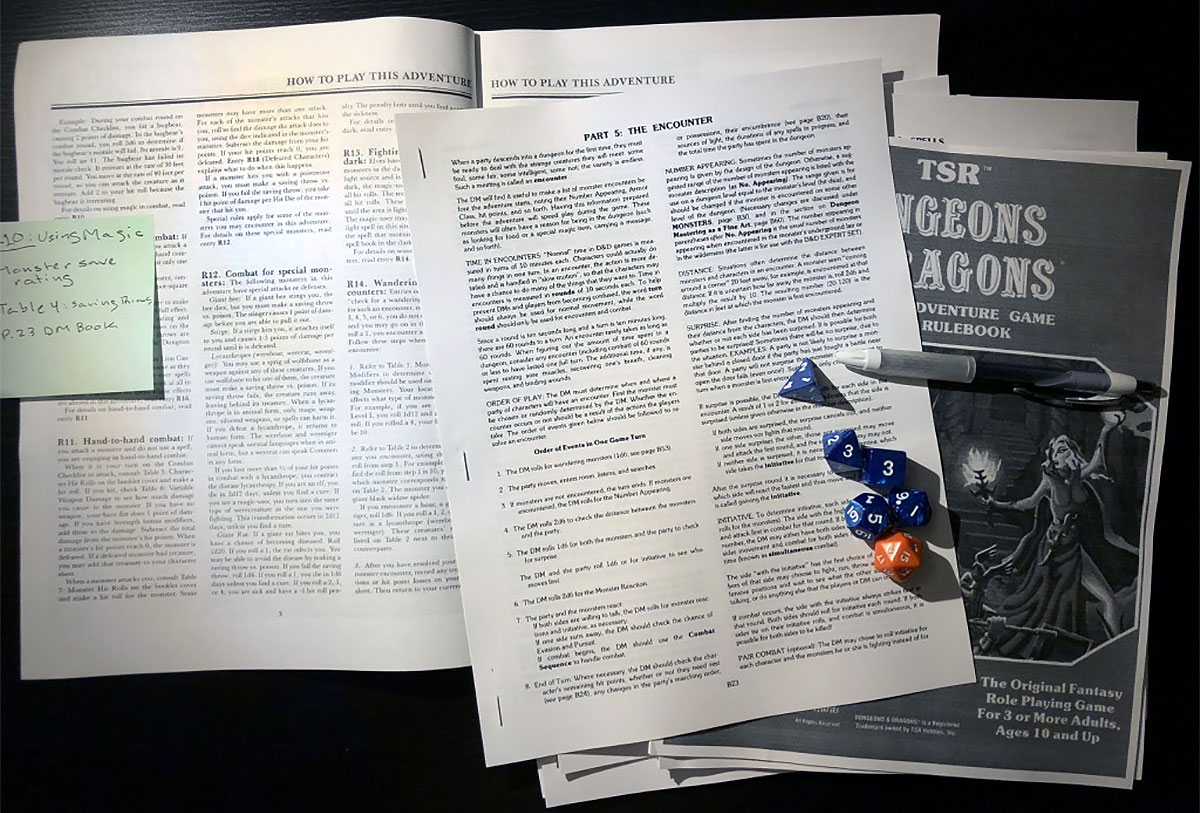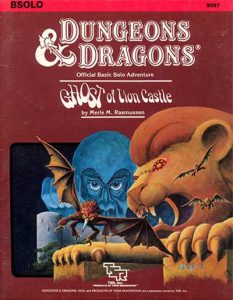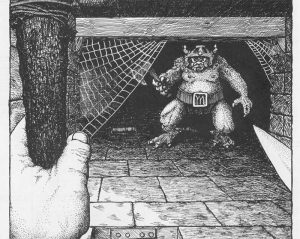
Do you remember this Dungeons and Dragons solo adventure module from 1984? It features an adventure through a haunted, lion-shaped castle in the “world of Sargon the Wizard” for characters level 1-3 using the Basic Dungeons and Dragons rule system.
 If you have even a passing familiarity with the world of both arcane and divine magics, then I daresay you are also a fan of role playing games. And of the wide variety of RPGs in existence, Dungeons and Dragons is undoubtedly a king among barons.
If you have even a passing familiarity with the world of both arcane and divine magics, then I daresay you are also a fan of role playing games. And of the wide variety of RPGs in existence, Dungeons and Dragons is undoubtedly a king among barons.
BSOLO – Ghost of Lion Castle was one of only a few solo adventures published by TSR for Dungeons and Dragons in the mid-1980s.
Its companion, XSOLO – Lathan’s Gold (for Expert Rules characters level 4-6), was published not long after. Both modules were written by Merle M. Rasmussen.
Ghost of Lion Castle
The adventure takes place in the ruins of Lion Castle, where the ghost of the former lord still haunts the halls. The players must explore the castle, fight off monsters and traps, and ultimately defeat the ghost to uncover the treasure hidden within.
The module includes detailed maps of the castle and its surrounding area, as well as descriptions of the various rooms and encounters. It also provides information on the history of the castle and its former inhabitants, which can help the players understand the motivations of the ghost and other characters they may encounter.
Ghost of Lion Castle is a full-fledged D&D module with color maps and great art by Bob Maurus. Though you can create any type of character to use with the module, it’s meant for elves and magic users. As such, it provides you a choice between a pre-generated elf or a wizard to use in your adventure.
 Though the gamebook uses passages to mark choices, it also uses a detailed map system to navigate through the castle — a map system which is left purposefully incomplete, forcing the reader to fill in the blanks.
Though the gamebook uses passages to mark choices, it also uses a detailed map system to navigate through the castle — a map system which is left purposefully incomplete, forcing the reader to fill in the blanks.
This solo adventure also uses a feature called the “Magic Journal” — essentially a blank outer margin where the reader can fill in notes. It also contains some useful notes already filled in reminding the character to make changes to their character sheet or giving some obscure but important points on the rules in play.
A couple tips to successfully complete this solo Dungeons and Dragons module and unlock the Secrets of Lion Castle:
- Plan ahead: Before venturing into the castle, take some time to plan your strategy with the rest of your party. Discuss each player’s strengths and weaknesses, and assign roles accordingly. This will help you work together more effectively and make the most of your abilities.
- Be prepared for combat: The castle is full of traps and monsters, so make sure you are well-prepared for combat. Bring plenty of weapons, armor, and healing potions, and be ready to use them when necessary. Make sure to also keep an eye out for any clues or information that can help you avoid traps or defeat enemies more easily.
- Pay attention to details: The module includes a lot of information about the castle and its history, and paying attention to these details can be crucial to completing the adventure. Take notes as you explore the castle, and try to piece together the clues to uncover the hidden treasure. Don’t be afraid to ask questions or investigate further if something seems out of place or suspicious.
Old School D&D Solo RPG Adventures
 I wish that TSR had created more solo modules like Ghost of Lion Castle. Aside from the BSOLO and XSOLO modules, they did publish a few other solo-oriented adventures.
I wish that TSR had created more solo modules like Ghost of Lion Castle. Aside from the BSOLO and XSOLO modules, they did publish a few other solo-oriented adventures.
Blizzard Pass by Zeb Cook and Maze of the Riddling Minotaur by Jeff Grub come to mind, as does the Advanced D&D adventure Midnight on Dagger Alley by Merle Rasmussen. Many of these featured either invisible ink or “magic viewer” gimmicks, however.
While both invisible ink and a (red plasticene) magic viewer both sound like interesting and novel ways to keep players from “cheating” in a solo adventure and enhance the sense of discovery, they don’t seem to have helped in preserving the physical longevity of the individual books.
I also suspect the difficulty and transferring those modules to PDF will make seeing them reissued for digital sale unlikely. Too bad, considering Zeb Cook and Jeff Grub are both RPG legends.